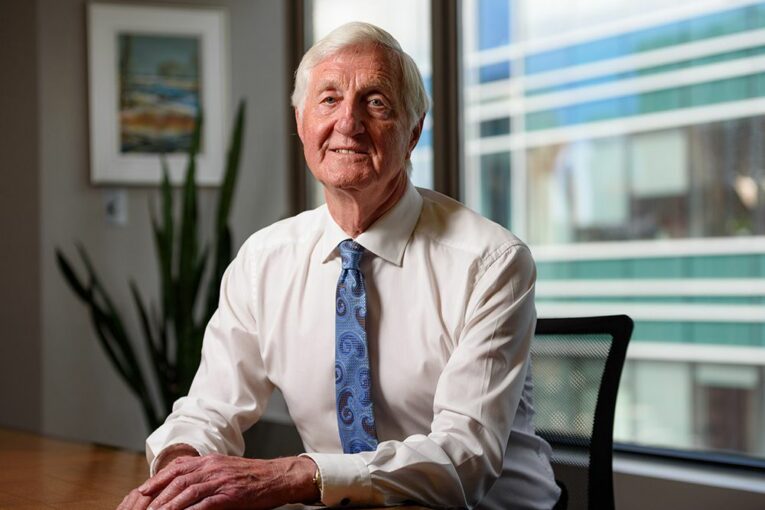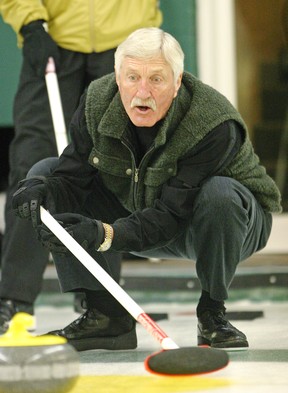
Saskatchewan farm kid turned world champion curler.
Marathon runner. Mining company executive.
It’s not a traditional resume for an oilpatch CEO.
After more than four decades in the Canadian oil and gas industry, Bonterra Energy CEO George Fink announced his retirement on Friday, preparing to step down after a long career in the sector with many twists and turns.
“I’ve been at it for a lot of years, putting in a lot of time, and just felt that I didn’t want to be working 10 hours every day,” he said in an interview.
“It’s not packing it in, but it’s certainly changing my role…I’m not prepared to just shut down and pull weeds in the backyard.”
Bonterra, a junior oil and gas producer that pumps out about 13,300 barrels of oil equivalent per day, named Patrick Oliver as the company’s incoming chief executive, effective Sept. 6.
A well-known industry veteran, Fink founded Bonterra in 1998. He spun it out of Comaplex Resources, his gold mining outfit based out of Calgary that was sold to Agnico-Eagle Mines in 2010 for a reported $762 million. (Comaplex was developing the Meliadine gold project near Rankin Inlet, Nunavut, which is now in operation.)
As the largest shareholder in Bonterra, with about 16 per cent, Fink will remain on the company’s board. He is also chairman of Calgary-based gas producer, Pine Cliff Energy, of which he owns about 11 per cent.
Fink has been active in industry groups for decades, serving as chair of the Small Explorers and Producers Association of Canada in the late 1990s during the debate surrounding the Kyoto climate accord. He’s also been a board member of the Canadian Association of Petroleum Producers.
“George is honestly a legend in this industry. There is no other way to say it,” said Tristan Goodman, president of the Explorers and Producers Association of Canada, where Fink is still a board member.
Born in the village of Vibank, Sask., Fink grew up on a farm in the province’s southeast before attending the University of Saskatchewan in the 1960s. He graduated with a bachelor of commerce degree and made his way west to Calgary in 1968.
Bonterra director Rodger Tourigny, who first met Fink in 1961 and became his university roommate — they later worked together at famed Canadian independent Ranger Oil — said his friend is unflappable, rolling with the ups and downs that have come with toiling in a rollercoaster industry.
“He’s a very quiet, very unassuming guy, and he never puts on a show,” said Tourigny. “He doesn’t get very excited — or doesn’t get very nervous or perturbed.”
That’s one of the reasons Pine Cliff CEO Phil Hodge said he often headed over to Fink’s office after 5 p.m., knowing he would still be at work, willing to offer thoughtful advice.
“He talks to everybody and he has time for everybody. He’s a great example of never letting the position, or the success of the company, alter in any way how he treats the people around him,” Hodge said.
Aside from Fink’s business career, athletics has been a key part of his journey. He turned down a partial baseball scholarship at a California university as a young man, saying he knew he lacked the necessary arm strength to play professionally.
He’s run 17 full marathons. Fink still runs and cycles several times a week and regularly curls with family members.
Picking up the winter sport as a youngster in Saskatchewan, he excelled at curling and eventually won several “carspiels.” Selling off the vehicles offered up as prizes allowed him to not be saddled with student loans.
“I ended up winning five cars in my curling career and sold every one of them. But that really helped from the standpoint of not having to worry about ever having any debt,” he said.

At the sport’s pinnacle, Fink was the third on the Ron Northcott team out of the Calgary Curling Club in 1966 that won the Brier national curling championship, and later captured the world championships that year.
Married to his wife Pat for 52 years, Fink spent time working in southeast Asia — including Singapore and Indonesia — for Ranger. He eventually decided to strike out on his own, founding his own resource companies based out of Calgary.
It’s been an eventful journey. Fink recalls the tough days for the industry with the National Energy Program in the 1980s, and has seen the highs of oil hitting US$147 a barrel in mid-2008, and crude prices crashing into negative territory during the early weeks of the pandemic, which led the company to suspend its dividend.
Bonterra has endured during an era of consolidation and a rapidly shrinking junior sector. Its stock price rose from $1.40 at the end of the 1990s to top $65 in August 2014, but plunged to 74 cents early in the pandemic. It has recovered to close at $8.55 on the Toronto Stock Exchange on Friday.
Analyst Jeremy McCrea of Raymond James said the company’s ability to navigate through the financial turmoil of the COVID-19 pandemic is part of Fink’s legacy, as other junior and mid-sized producers disappeared.
“It has been survival of the fittest and this industry is incredibly hard for juniors to be successful,” he said.
Fink said one of his business philosophies has been to try and return money to shareholders rather than fund massive production growth. Bonterra distributed more than $1.1 billion between ‘98 and the first quarter of 2020.
Mike Tims, former chairman of Peters & Co. who has known Fink for three decades, said the long-time CEO was focused on returns to investors “long before it became an important factor on Wall Street and Bay Street.”
As for the future, Fink intends to stay involved in the industry, although he will spend less time on day-to-day issues.
“I still think that there’s an awful lot of room for having success with the industry,” he said.
“I’m still pretty optimistic that the energy industry is going to be required for quite a few years into the future.”
Chris Varcoe is a Calgary Herald columnist.
You can read more of the news on source
